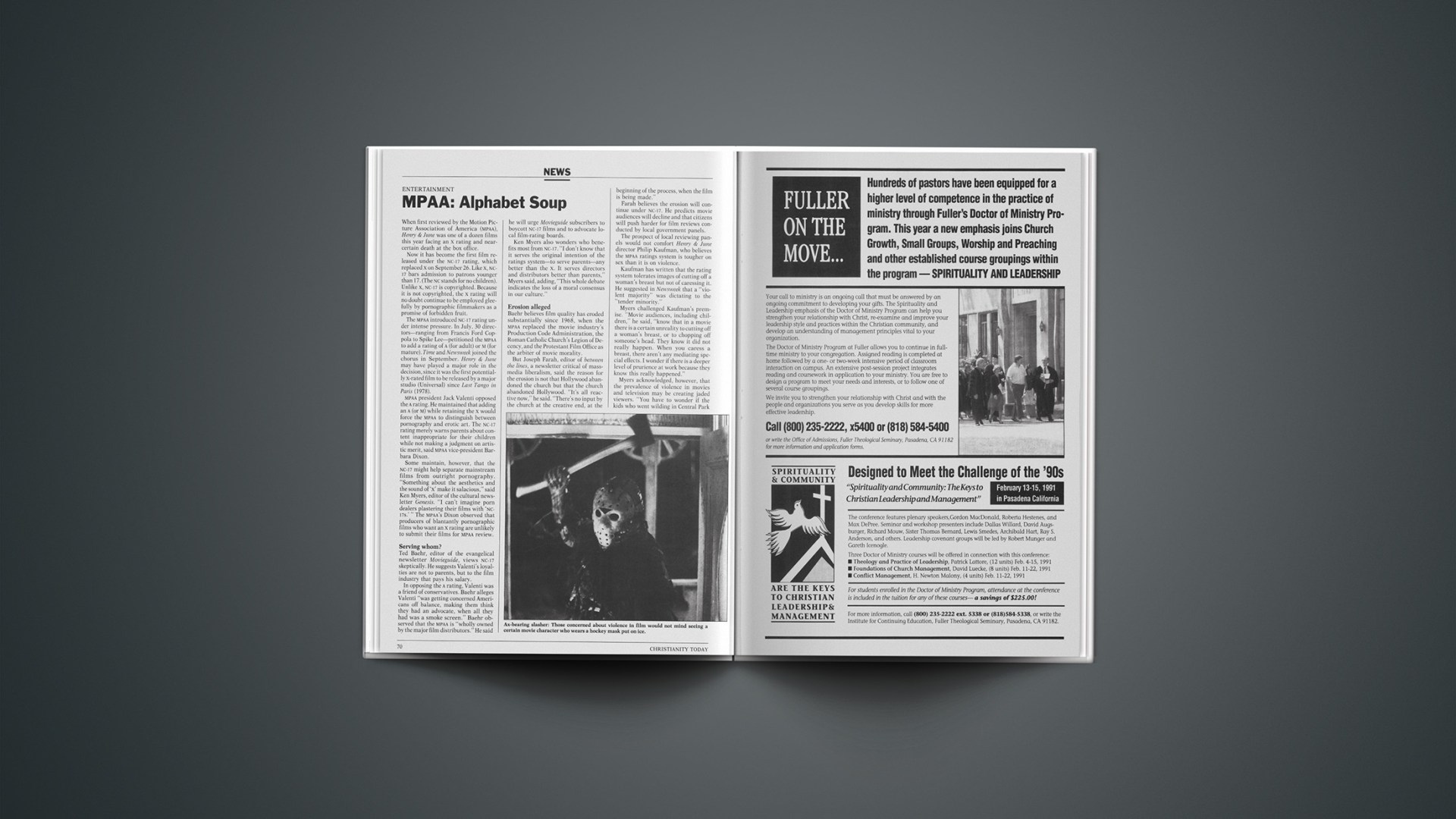When first reviewed by the Motion Picture Association of America (MPAA), Henry & June was one of a dozen films this year facing an X rating and near-certain death at the box office.
Now it has become the first film released under the NC-17 rating, which replaced X on September 26. Like X, NC-17 bars admission to patrons younger than 17. (The NC stands for no children). Unlike X, NC-17 is copyrighted. Because it is not copyrighted, the X rating will no doubt continue to be employed gleefully by pornographic filmmakers as a promise of forbidden fruit.
The MPAA introduced NC-17 rating under intense pressure. In July, 30 directors—ranging from Francis Ford Coppola to Spike Lee—petitioned the MPAA to add a rating of A (for adult) or M (for mature). Time and Newsweek joined the chorus in September. Henry & June may have played a major role in the decision, since it was the first potentially X-rated film to be released by a major studio (Universal) since Last Tango in Paris (1978).
MPAA president Jack Valenti opposed the A rating. He maintained that adding an A (or M) while retaining the X would force the MPAA to distinguish between pornography and erotic art. The NC-17 rating merely warns parents about content inappropriate for their children while not making a judgment on artistic merit, said MPAA vice-president Barbara Dixon.
Some maintain, however, that the NC-17 might help separate mainstream films from outright pornography. “Something about the aesthetics and the sound of ‘X’ make it salacious,” said Ken Myers, editor of the cultural newsletter Genesis. “I can’t imagine porn dealers plastering their films with ‘NC-17s.’ ” The MPAA’s Dixon observed that producers of blantantly pornographic films who want an X rating are unlikely to submit their films for MPAA review.
Serving Whom?
Ted Baehr, editor of the evangelical newsletter Movieguide, views NC-17 skeptically. He suggests Valenti’s loyalties are not to parents, but to the film industry that pays his salary.
In opposing the A rating, Valenti was a friend of conservatives. Baehr alleges Valenti “was getting concerned Americans off balance, making them think they had an advocate, when all they had was a smoke screen.” Baehr observed that the MPAA is “wholly owned by the major film distributors.” He said he will urge Movieguide subscribers to boycott NC-17 films and to advocate local film-rating boards.
Ken Myers also wonders who benefits most from NC-17. “I don’t know that it serves the original intention of the ratings system—to serve parents—any better than the X. It serves directors and distributors better than parents,” Myers said, adding, “This whole debate indicates the loss of a moral consensus in our culture.”
Erosion Alleged
Baehr believes film quality has eroded substantially since 1968, when the MPAA replaced the movie industry’s Production Code Administration, the Roman Catholic Church’s Legion of Decency, and the Protestant Film Office as the arbiter of movie morality.
But Joseph Farah, editor of between the lines, a newsletter critical of mass-media liberalism, said the reason for the erosion is not that Hollywood abandoned the church but that the church abandoned Hollywood. “It’s all reactive now,” he said. “There’s no input by the church at the creative end, at the beginning of the process, when the film is being made.”
Farab believes the erosion will continue under NC-17. He predicts movie audiences will decline and that citizens will push harder for film reviews conducted by local government panels.
The prospect of local reviewing panels would not comfort Henry & June director Philip Kaufman, who believes the MPAA ratings system is tougher on sex than it is on violence.
Kaufman has written that the rating system tolerates images of cutting off a woman’s breast but not of caressing it. He suggested in Newsweek that a “violent majority” was dictating to the “tender minority.”
Myers challenged Kaufman’s premise. “Movie audiences, including children,” he said, “know that in a movie there is a certain unreality to cutting off a woman’s breast, or to chopping off someone’s head. They know it did not really happen. When you caress a breast, there aren’t any mediating special effects. I wonder if there is a deeper level of prurience at work because they know this really happened.”
Myers acknowledged, however, that the prevalence of violence in movies and television may be creating jaded viewers. “You have to wonder if the kids who went wilding in Central Park had twisted imaginations,” he said.
Evangelical critics and filmmakers agree MPAA ratings alone provide woefully insufficient guidance for parents. “I’m always bemused by Christians who regard the system almost as inerrant,” said Myers. “They won’t go to any R-rated films, but they show no discrimination in what PG-13 films they see or let their children see.”
“The system as a whole has not worked for me, from PG up,” said director Antonio Zarro, a CBN (now called Regent) University alumnus who won an Academy Student Film Award for Bird in a Cage. Suggesting the system is arbitrary, he added, “The films I’m making will not get an NC-17, but they could get anything from an R to a G.”
Director Franky Schaeffer called the MPAA ratings “capricious,” adding that there is no easy alternative to “actively participating with your children in what they’re seeing.” Said Schaeffer, “As a parent, I cannot recall a time when I have either taken my children to a film, or kept them from a film, on the basis of what someone else has said.”










